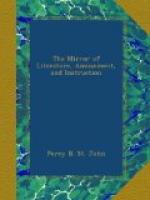BEES’ NESTS.
A French journal says, in the woods of Brazil is frequently found hanging from the branches the nest of a species of bee, formed of clay, and about two feet in diameter. It is more probable that these nests belong to some species of wasp, many of which construct hanging nests. One sort of these is very common in the northern parts of Britain, though it is not often found south of Yorkshire.
* * * * *
SPIRIT OF THE PUBLIC JOURNALS.
* * * * *
ASSASSINATION OF MAJOR LAING.
The Literary Gazette of Saturday last contains the following very interesting intelligence respecting the assassination of Major Laing, and the existence of his Journal;—“In giving this tragical and disgraceful story to the British public, (says the Editor), we may notice that the individual who figures so suspiciously in it, viz. Hassouna d’Ghies, must be well remembered a few years ago in London society. We were acquainted with him during his residence here, and often met him, both at public entertainments and at private parties, where his Turkish dress made him conspicuous. He was an intelligent man, and addicted to literary pursuits; in manners more polished than almost any of his countrymen whom we ever knew, and apparently of a gentler disposition than the accusation of having instigated this infamous murder would fix upon him.”
The account then proceeds with the following translation from a Marseilles Journal:—
It was about three years ago, that Major Laing, son-in-law of Colonel Hammer Warrington, consul-general of England in Tripoli, quitted that city, where he left his young wife, and penetrated into the mysterious continent of Africa, the grave of so many illustrious travellers. After having crossed the chain of Mount Atlas, the country of Fezzan, the desert of Lempta, the Sahara, and the kingdom of Ahades, he arrived at the city of Timbuctoo, the discovery of which has been so long desired by the learned world. Major Laing, by entering Timbuctoo, had gained the reward of 3,000_l_. sterling, which a learned and generous society in London had promised to the intrepid adventurer who should first visit the great African city, situated between the Nile of the Negroes and the river Gambaron. But Major Laing attached much less value to the gaining of the reward than to the fame acquired after so many fatigues and dangers. He had collected on his journey valuable information in all branches of science: having fixed his abode at Timbuctoo, he had composed the journal of his travels, and was preparing to return to Tripoli, when he was attacked by Africans, who undoubtedly were watching for him in the desert. Laing, who had but a weak escort, defended himself with heroic courage: he had at heart the preservation




